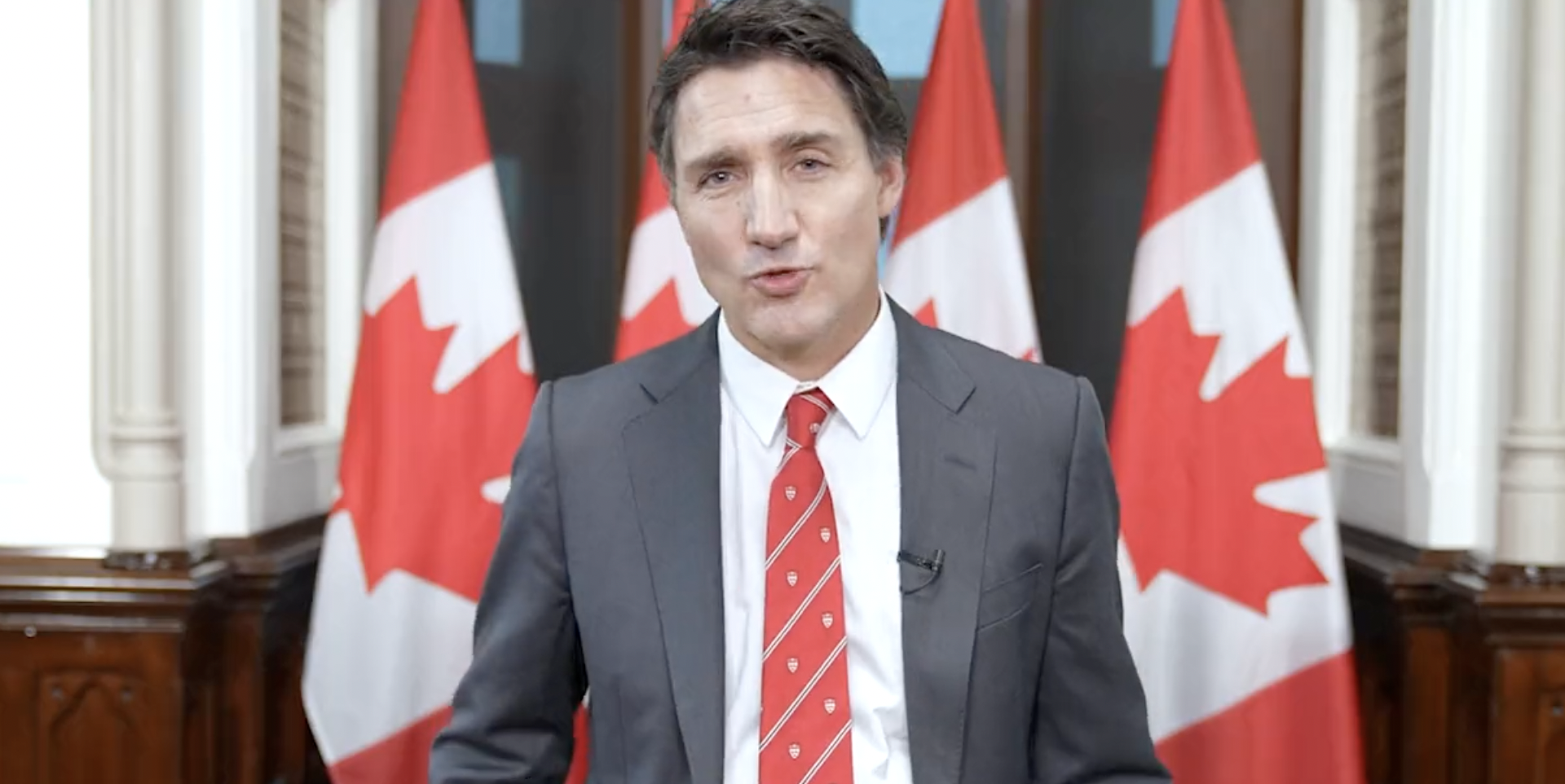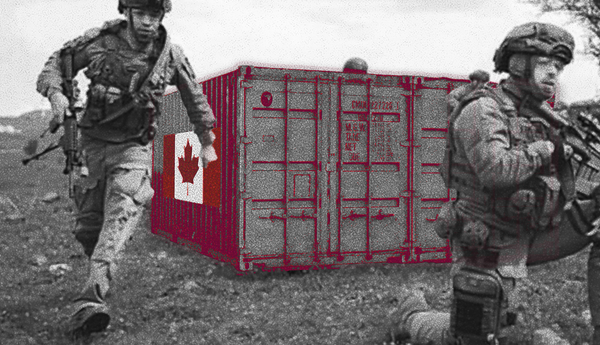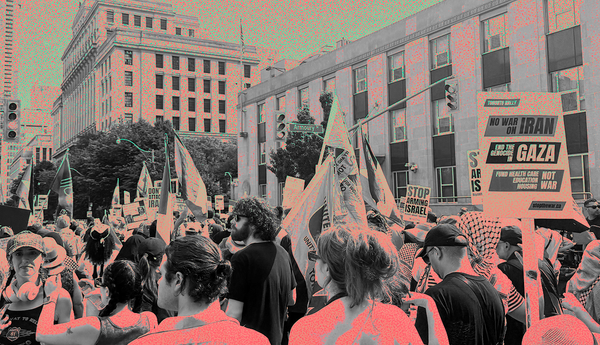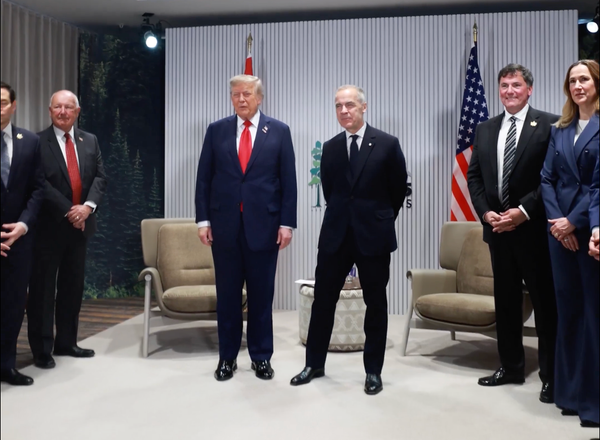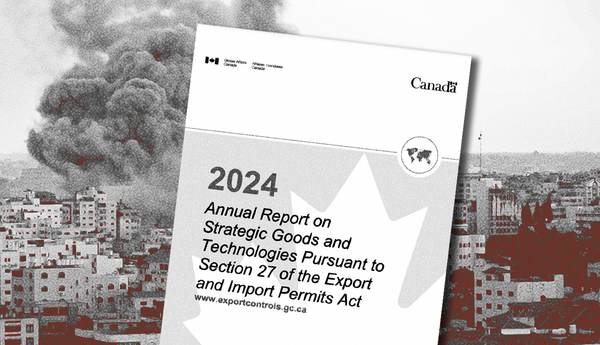Following weeks of questions from The Maple and human rights advocates, Global Affairs Canada (GAC) admitted in a statement sent to The Maple this week that it has authorized new permits for unspecified military exports to Israel since October 7.
GAC described the goods as “non-lethal equipment,” but an arms monitoring expert told The Maple that the term does not have a fixed legal definition, meaning that the exports could include items that are being used by Israel in its brutal war on Gaza.
GAC spokesperson Jean-Pierre J. Godbout said in an emailed statement to The Maple that “Canada has not received any requests, and therefore not issued any permits, for full weapon systems for major conventional arms or light weapons to Israel for over 30 years.”
However, the statement continued: “The permits which have been granted since October 7, 2023, are for the export of non-lethal equipment [Emphasis added].”
GAC’s statement is the first time it has publicly admitted to authorizing new exports of military goods to Israel since October 7.
GAC did not respond to a follow-up request asking for it to clarify what it means by “non-lethal equipment.” GAC also did not provide any information on the quantity or value of the equipment that it authorized for export, or which of Canada’s Export Control List (ECL) categories the goods fall under.
In previous public statements regarding transfers of military equipment to Ukraine, GAC has described items such as rifle scopes, laser range finders and tactical gear as “non-lethal.”
GAC’s statement noted that export-controlled items include products designed for both civilian and military purposes, but gave no indication that the exports to Israel authorized since October 7 fall into that category.
Kelsey Gallagher, a researcher with Project Ploughshares, told The Maple that “non-lethal equipment” is a vague term that sits between shifting goalposts.
“Non-lethal military equipment has not been defined by the government of Canada,” said Gallagher. “It could be really anything that doesn’t itself deliver a killing blow, but [could be] a component that’s integrated into something that does.”
“I don’t understand why the government has to be so shadowy about this,” he added.
In 2022, the year for which the most recent military export data is available, $10.4 million of Canada’s total $21 million in military exports to Israel consisted of goods relating to “electronic equipment.”
As of that year, there were 315 active permits for military sales to Israel, with no sign that the Trudeau government cancelled or suspended any of those permits that might still have been in use when Israel began its latest bombing campaign on Gaza.
As well, Project Ploughshares recently published a report warning that some Canadian-made components, including those found in F-35 fighter jets, are first shipped to the United States and then ultimately supplied to the Israeli military. Israel has used F-35s in its bombing of Gaza.
Project Ploughshares stated that “Given the substantial risk that Canadian military goods could contribute to [...] abuses in Gaza, Canada must immediately halt all transfers of weapons to Israel.”
GAC’s latest statement came after weeks of contradicting and unclear statements that led to anti-war activists and humanitarian organizations accusing the Trudeau government of deliberately sowing confusion about Canadian military exports to Israel.
Michael Bueckert, vice president of Canadians for Justice and Peace in the Middle East (CJPME), told The Maple that the confirmation that Canada is still authorizing military exports to Israel is not surprising, but appalling given the mounting allegations that Israel is committing a genocide in Gaza.
“It’s what we expected, but it’s pretty shameful that that is actually the case,” he explained, adding that GAC’s latest statement follows a pattern of vague messaging on the issue and appears intended to confuse the public.
“They’re trying to create new categories where they don’t exist,” said Bueckert. “All of these attempts to try to confuse people and to try to distort the situation are revealing, because instead of actually standing by its own policy, it almost feels like [GAC] can’t defend its policy and has to create all of these bizarre excuses and distinctions that don’t make a difference.”
While GAC says it reviews export permit applications on a case-by-case basis, CJPME is calling for a blanket embargo on military exports to Israel.
“Especially now, given the very plausible possibility, according to the International Court of Justice, that it’s actually a context of genocide, there is no such thing as safe military exports into that context from a human rights perspective,” said Bueckert.
“If [the goods are] under the military export regime, it means that there’s some sort of connection [to] this overall context of violence.”
To date, Israel’s bombing campaign has killed more than 26,000 Palestinians, including at least 10,000 children. Following a case presented by South Africa accusing Israel of genocide, the International Court of Justice (ICJ) recently ordered that Israel must take steps to prevent acts of genocide as defined under the 1948 Genocide Convention.
While the order is not a final verdict on whether or not Israel is committing genocide – a decision that could take years – the order indicates that the court regards South Africa’s case as having merit.
Following that order, Foreign Affairs Minister Melanie Joly stated that while Canada supports the ICJ’s role, that “does not mean that we accept the premise of the case brought by South Africa.” Her comments echoed an earlier statement she made as well as similar remarks made by Prime Minister Justin Trudeau.
The statement repeated the Trudeau government’s often repeated support for “Israel’s right to exist and defend itself,” but did not call on Israel to abide by the ICJ’s orders or express support for the court’s ruling.
CJPME called Joly’s statement “shamefully inadequate,” noting that it was “out of step with most Western governments including the European Union, Norway, New Zealand, Slovenia, Spain, Ireland, Belgium, and even Germany, which have all called on parties to comply with the ruling.”
Israel’s war on Gaza followed an assault led by Hamas on Israel on October 7, which resulted in the deaths of approximately 700 civilians in Israel, along with hundreds of military and security personnel.
The Hamas-led attack came in the context of Israel’s 16-year blockade of Gaza, during which conditions in the besieged strip were described as “unliveable” by the United Nations before Israel’s most recent attack.
Last week, the Trudeau government announced that it was joining the United States in pausing Canadian funding for the United Nations aid agency for Palestinian refugees (UNRWA), based on unproven Israeli allegations that a handful of UNRWA employees participated in the October 7 attack.
Doctors Without Borders (MSF) said it was “deeply alarmed” by the decisions to cut the UNRWA funding, noting that in Gaza “the humanitarian crisis has reached catastrophic levels, and any additional limitations on aid will result in more deaths and suffering.”
“The consequences these cuts in funding will have on the ground contradict the provisional measures issued by the International Court of Justice on Friday (26th January), which include immediate measures to ensure sufficient humanitarian aid flows into Gaza,” the MSF statement added.
Canada’s Arms Trade Obligations
Canada is a signatory to the Arms Trade Treaty (ATT), an international agreement enshrined in Canada’s export control legislation, the Export and Import Permits Act (EIPA).
Under that legislation, Canada’s foreign affairs minister must deny export applications for military goods “if there is a substantial risk that the items would undermine peace and security, or could be used to commit or facilitate serious violations of international humanitarian and human rights laws.”
Article Four of the ATT states that each signatory party must establish a “control system to regulate the export of parts and components where the export is in a form that provides the capability to assemble [...] conventional arms.” However, the ATT does not specifically define what constitutes a “component,” leading to criticism that the term’s ambiguity allows for subjective interpretations by the governments of signatory states.
Human rights advocates have long argued that Canada’s human rights assessments of military exports are woefully inadequate, particularly given the federal government’s decision to authorize and continue to allow the sale of light-armoured vehicles to Saudi Arabia.
“[The Canadian government’s] standards are extraordinarily low, but without actually providing Canadians with any level of transparency to evaluate what we’re actually selling, they’re just asking us to trust them on it,” said Bueckert.
Alex Cosh is the news editor of The Maple.


